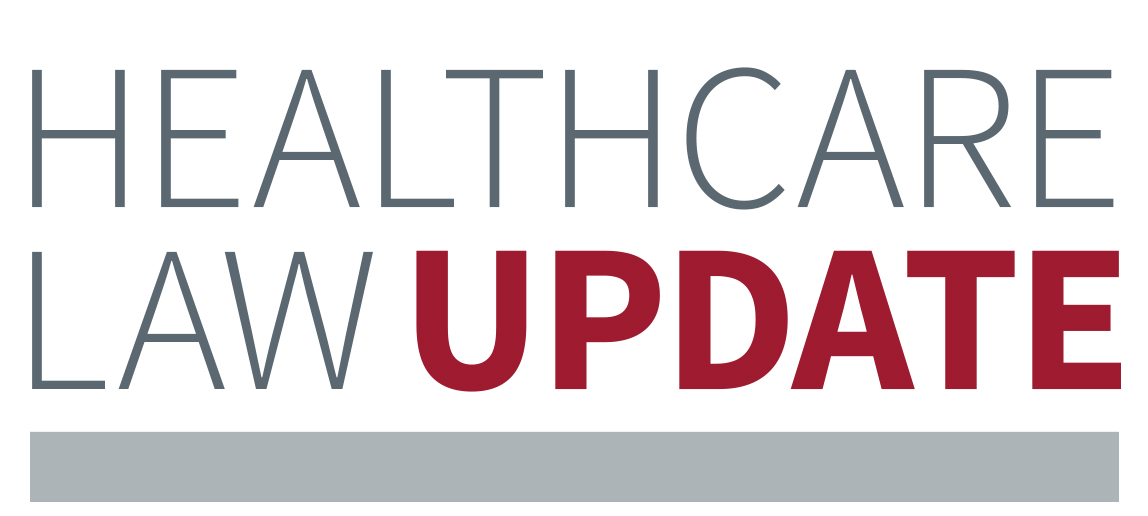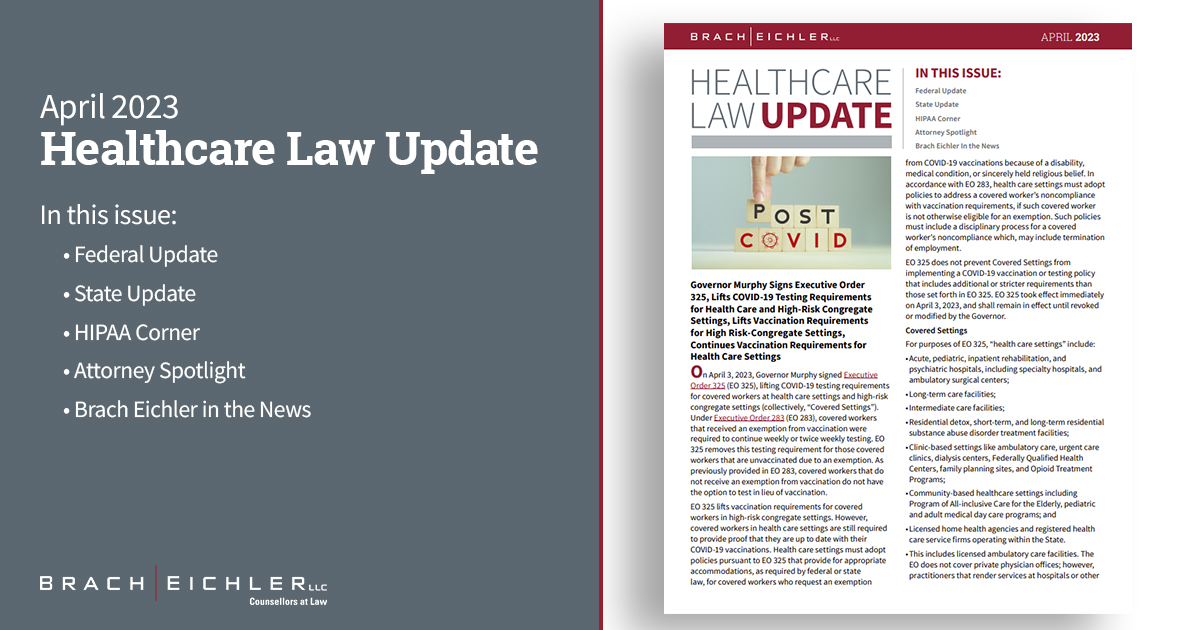


On April 3, 2023, Governor Murphy signed Executive Order 325 (EO 325), lifting COVID-19 testing requirements for covered workers at health care settings and high-risk congregate settings (collectively, “Covered Settings”). Under Executive Order 283 (EO 283), covered workers that received an exemption from vaccination were required to continue weekly or twice weekly testing.
EO 325 removes this testing requirement for those covered workers that are unvaccinated due to an exemption. As previously provided in EO 283, covered workers that do not receive an exemption from vaccination do not have the option to test in lieu of vaccination. EO 325 lifts vaccination requirements for covered workers in high-risk congregate settings. However, covered workers in health care settings are still required to provide proof that they are up to date with their COVID-19 vaccinations. Health care settings must adopt policies pursuant to EO 325 that provide for appropriate accommodations, as required by federal or state law, for covered workers who request an exemption
from COVID-19 vaccinations because of a disability, medical condition, or sincerely held religious belief. In accordance with EO 283, health care settings must adopt policies to address a covered worker’s noncompliance with vaccination requirements, if such covered worker is not otherwise eligible for an exemption. Such policies must include a disciplinary process for a covered worker’s noncompliance which, may include termination of employment.
EO 325 does not prevent Covered Settings from implementing a COVID-19 vaccination or testing policy that includes additional or stricter requirements than those set forth in EO 325. EO 325 took effect immediately on April 3, 2023, and shall remain in effect until revoked or modified by the Governor.
Covered Settings
For purposes of EO 325, “health care settings” include:
- Acute, pediatric, inpatient rehabilitation, and psychiatric hospitals, including specialty hospitals, and ambulatory surgical centers;
- Long-term care facilities;
- Intermediate care facilities;
- Residential detox, short-term, and long-term residential substance abuse disorder treatment facilities;
- Clinic-based settings like ambulatory care, urgent care clinics, dialysis centers, Federally Qualified Health Centers, family planning sites, and Opioid Treatment Programs;
- Community-based healthcare settings including Program of All-inclusive Care for the Elderly, pediatric and adult medical day care programs; and
- Licensed home health agencies and registered health care service firms operating within the State.
- This includes licensed ambulatory care facilities. The EO does not cover private physician offices; however, practitioners that render services at hospitals or other
For purposes of EO 325, “high-risk congregate settings” include:
- State and county correctional facilities;
- All congregate care settings operated by the Juvenile Justice Commission, which includes secure care facilities and residential community homes;
- Licensed community residences for individuals with intellectual and developmental disabilities (“IDD”) and traumatic brain injury (“TBI”);
- Licensed community residences for adults with mental illness;
- Certified day programs for individuals with IDD and TBI; and
- Group homes and psychiatric community homes licensed by the Department of Children and Families.
Covered Workers
For purposes of EO 325, “covered workers” are defined as:
- Full and part-time employees;
- Contractors; and
- Other individuals working in covered settings, including individuals providing operational, custodial services or administrative support.
“Up to Date” with COVID-19 Vaccinations
For purposes of EO 325, a covered worker will be considered “up to date” with COVID-19 vaccinations if the covered worker has received a primary series, which consists of either a 2-dose series of an mRNA COVID-19 or protein subunit vaccine, or a single dose viral vector COVID-19 vaccine, and the first booster dose for which they are eligible as recommended by the CDC.
If you have any questions about EO 325 or need assistance in implementing your COVID-19 vaccination policies, please feel free to contact any of the attorneys listed below.
For more information, contact:
John D. Fanburg, Chair | 973.403.3107 | jfanburg@bracheichler.com
Joseph M. Gorrell | 973.403.3112 | jgorrell@bracheichler.com
Cynthia J. Liba | 973.403.3106 | cliba@bracheichler.com
On April 10, 2023, President Joe Biden signed a resolution to end the national COVID-19 emergency, one month earlier than the previously scheduled end date of May 11, 2023. The national emergency was one of two COVID-19 emergencies that provided specific permissions and support during the pandemic. The resolution will not have any impact on the public health emergency which will continue to be in effect until May 11, 2023.
The expiration of the national emergency will terminate certain government mandates that were put in effect as a result of the COVID-19 pandemic, including mandating extended special enrollment periods in certain health insurance plans upon the occurrence of certain life events such as loss of alternate coverage, getting married or having children. Certain mandates related to COBRA insurance coverage will also expire, including rules allowing terminated employees extra time to pay their COBRA premiums or to decide whether to enroll in COBRA coverage. Certain other mandates will terminate with the end of the public health emergency in May, including COVID-19 testing and vaccine mandates for employers and requirements for health insurance plans to fully cover COVID-19 testing on both in-network and out-of-network bases.
The U.S. Department of Labor, U.S. Department of Health and Human Services, and U.S. Department of the Treasury have issued frequently asked questions (FAQs) and guidance to assist employers in preparing for the impact of the expiration of the COVID-19 national emergency and public health emergency. The Centers for Medicare & Medicaid Services has also provided an updated factsheet for Medicare and Medicaid providers regarding how the end of the emergencies will affect existing Covid-19 waivers and flexibilities that have been in existence since 2020.
For more information, contact:
Carol Grelecki | 973.403.3140 | cgrelecki@bracheichler.com
Jonathan J. Walzman | 973.403.3120 | cjwalzman@bracheichler.com
Harshita Rathore | 973.364.8393 | hrathore@bracheichler.com
On March 13, 2023, the Department of Justice (DOJ) commenced an action against Rite Aid for violating the False Claims Act (FCA) and Controlled Substances Act (CSA) by knowingly filling unlawful prescriptions for controlled substances.
The complaint alleges that from March 2014 through June 2019, Rite Aid knowingly filled thousands of unlawful prescriptions for controlled substances, despite clear red flags that the prescriptions were unlawful. The prescriptions included excessive quantities of opioids, such as oxycodone and fentanyl. The DOJ said that the prescriptions lacked a legitimate medical purpose, were not for a medically accepted indication, or were not issued in the usual course of professional practice. The DOJ also stated that Rite Aid intentionally deleted internal notes about suspicious prescribers and directed district managers to tell pharmacists “to be mindful of everything that is put in writing.”
Knowingly filling unlawful prescriptions for controlled substances is a violation of the CSA. Seeking reimbursement from federal healthcare programs for unlawfully filled prescriptions is a violation of the FCA. The DOJ stated that it is committed to confronting the opioid crisis and will hold accountable to any individuals or entities, including pharmacies, that fuel the crisis.
For more information, contact:
Lani M. Dornfeld, CHPC | 973.403.3136 | ldornfeld@bracheichler.com
Edward J. Yun | 973.364.5229 | eyun@bracheichler.com
Sally Olson | 973.403.3102 | solson@bracheichler.com
On March 23, 2023, the Department of Justice announced that a Texas-based ophthalmology provider group, Kleiman Evangelista Eye Centers (KE), agreed to pay $2,902,505 to resolve allegations that it offered and paid kickbacks to optometrists to induce referrals of patients who were candidates for cataract surgery in violation of the False Claims Act and Anti-Kickback Statute.
The claims against KE related to its co-management arrangements with referring optometrists. Co-management of cataract surgery patients is a

common practice between optometrists and the ophthalmologists to whom they refer patients. Although such arrangements are permissible, to the extent they provide either party with financial benefits in exchange for referrals, they can pose a liability to the parties under the Anti-Kickback Statute, which prohibits offering, paying, soliciting, or receiving remuneration to induce referrals of items or services covered by Medicare, Medicaid, and other federally funded programs.
In this case, the government accused KE of providing unlawful remuneration to referring optometrists by paying the optometrists additional fees for referring cataract patients who received premium intraocular lenses or laser-assisted cataract surgery (in addition to the reimbursement already received by the optometrists from Medicare and Medicaid for performing post-operative cataract care). Additionally, KE is accused of guaranteeing the automatic return of referred patients, providing the optometrists free continuing education courses, rewarding top referring optometrists with expensive dinners, and inviting referring optometrists, their families, and staff to major-league baseball games at the company suite.
The case was brought by a relator physician affiliated with KE and was part of a coordinated effort with the U.S. Attorney’s Office, Eastern District of Texas, and the United States Department of Health and Human Services, Office of Inspector General. The claims resolved by the settlement were for allegations only, and there was no determination of liability.
For more information, contact:
Isabelle Bibet-Kalinyak | 973.403.3131 | ibibetkalinyak@bracheichler.com
Riza I. Dagli | 973.403.3103 | rdagli@bracheichler.com
Caroline J. Patterson | 973.403.3141 | cpatterson@bracheichler.com
Covenant Healthcare System, a regional Michigan-based hospital system, and two affiliated physicians agreed to pay over $69 million to settle three related legal actions alleging False Claims Act violations. The claims related to Covenant’s improper financial relationships with eight referring physicians and a physician-owned investment group which resulted in the submission of false claims to the Medicare, Medicaid, TRICARE, and FECA programs.
According to the Department of Justice, Covenant had contracts with six separate physicians to act as medical directors between 2006 and 2016 that did not satisfy any exceptions or safe-harbors under the Federal Anti Kickback Statute (AKS) or Stark Law, resulting in payments by Covenant to these physicians that violated the False Claims Act. Covenant also allowed its Covenant Physician Investment Group to secure an equipment lease through non-arm’s-length negotiations to drive up patient referrals from these physicians, which also violated the False Claims Act.
The AKS prohibits offering, paying, soliciting, or receiving remuneration to induce referrals of items or services covered by Medicare, Medicaid, and other federally-funded programs. The physician self-referral law, commonly known as the Stark Law, prohibits a hospital from billing Medicare for certain designated health services referred by physicians with whom the hospital has an improper financial arrangement, including the payment of compensation that exceeds the fair market value of the services actually provided by the physician and the provision of free or below-market rent. Both the AKS and the Stark Law are intended to ensure that a physician’s medical judgment is not compromised by improper financial incentives and instead is based on the best interests of the patient.
For more information, contact:
Keith J. Roberts | 973.364.5201 | kroberts@bracheichler.com
Jonathan J. Walzman | 973.403.3120 | cjwalzman@bracheichler.com
Paul DeMartino, Jr. | 973.364.5228 | pdemartino@bracheichler.com

A federal judge in Texas recently struck down a key provision of the Affordable Care Act (ACA) that requires most insurers to cover certain preventive care services at no cost to patients, such as cancer screenings, contraception, and HIV prevention treatment. The decision comes nearly four years after the same federal judge ruled that the ACA was unconstitutional, a ruling that was later overturned by the United States Supreme Court.
The ruling blocks an ACA requirement for most insurers to cover certain forms of preventive care such as cancer screenings that were recommended by the Preventive Services Task Force (PSTF), an independent, volunteer panel of national experts in disease prevention and evidence-based medicine. According to the judge’s decision, reliance upon recommendations by the PSTF is unconstitutional because the recommendations are not subject to congressional oversight or public comment. Last year, the same judge also struck down provisions of the ACA requiring certain health plans to provide the HIV prevention treatment known as PrEP, which is a pill taken daily to prevent infection, a decision that also undercut the broader system that determines which preventive drugs are covered in the United States, on the same grounds.
The plaintiffs in each of these underlying cases claimed that the mandates in question violate their religious freedom and the U.S. Constitution. The Biden administration and more than 20 states defended the preventive care provisions in court and warned that a ruling to overturn these mandates could create extraordinary upheaval in the U.S. public health system. The Biden administration is likely to appeal this decision.
For more information, contact:
Joseph M. Gorrell | 973.403.3112 | jgorrell@bracheichler.com
Caroline J. Patterson | 973.403.3141 | cpatterson@bracheichler.com
Emily J. Harris | 973.364.5205 | eharris@bracheichler.com

On March 9, 2023, the United States Food and Drug Administration (FDA) issued a final rule, amending the Mammography Quality Standards Act (MQSA) of 1992, to require mammogram providers to notify women if they have dense breast tissue and recommend that they consult with a doctor about whether they need additional screening. Mammogram providers will be required to implement the new standards within 18 months.
Dense breasts have been identified as a risk factor for developing breast cancer and can make cancers more difficult to detect on a mammogram. Approximately half of the women over the age of 40 in the United States have dense breast tissue.
New Jersey implemented a similar law in 2014 which, requires mammogram providers to notify patients if they have dense breast tissue. New Jersey also requires insurers to cover breast follow-up evaluations, such as ultrasounds in women with dense breast tissue.
For more information, contact:
John D. Fanburg, Chair | 973.403.3107 | jfanburg@bracheichler.com
Carol Grelecki | 973.403.3140 | cgrelecki@bracheichler.com
Harshita Rathore | 973.364.8393 | hrathore@bracheichler.com
On March 17, 2023, a Pennsylvania Commonwealth Court held that an employee was entitled to reimbursement for medical marijuana as recommended and deemed necessary by his physician under the state Workers’ Compensation Act.
The decision is significant because the court addressed the conflict between Pennsylvania’s Medical Marijuana Act (MMA), which recognizes medical marijuana as a bona
fide medical treatment for several conditions, and the federal Controlled Substances Act (Federal Drug Act), which prohibits any use of or payment for marijuana. The court’s majority found that providing reimbursement for treatment prescribed by a physician under the provisions of the MMA would not cause the insurer to “manufacture, distribute, or dispense” a controlled substance and, therefore, did not violate federal law.
The court also held that because the MMA recognizes the validity of medical marijuana as a treatment for chronic pain, an insurer cannot deny an employee the right to receive reimbursement for medically necessary and legal treatment. The court specifically distinguished between “coverage” and “reimbursement,” finding that while the employer could not be compelled to provide insurance coverage under the MMA, the MMA also provides that an employee could not be denied a “right or privilege” based on medical marijuana use. It was noted that several states had specifically excluded “reimbursement” from their statutes and Pennsylvania’s failure to do so was deemed evidence of intent under the MMA to include an insurer’s “reimbursement” obligations.
The decision is a matter of first impression in Pennsylvania and is consistent with similar holdings in New Mexico, New Jersey, New Hampshire, New York, and Connecticut.
For more information, contact:
John D. Fanburg, Chair | 973.403.3107 | jfanburg@bracheichler.com
Riza I. Dagli | 973.403.3103 | rdagli@bracheichler.com
Caroline J. Patterson | 973.403.3141 | cpatterson@bracheichler.com
On April 4, 2023, Governor Phil Murphy signed Executive Order No. 326 (EO 326) establishing New Jersey as a safe haven for gender-affirming health care.
EO 326 directs State departments and agencies to protect patients and health care professionals against legal repercussions for providing, receiving, assisting in providing or receiving, seeking, and traveling to New Jersey for gender-affirming health care services. The order explicitly prohibits government departments, agencies, and officials in the State from cooperating with investigations seeking to “impose civil or criminal liability or professional sanctions” on people providing or having gender-affirming healthcare in New Jersey.
For purposes of EO 326, “gender-affirming health care” includes services that address a transgender or nonbinary person’s physical, mental, or social health needs, and that are designed to support and affirm a transgender or nonbinary person’s gender identity, including but not limited to, mental health or psychiatric care; surgery, hormone replacement therapy and other nonsurgical treatments intended to align aspects of a person’s life with their gender identity and other behavioral or medical interventions, treatments, and therapies designed to support and affirm an individual’s gender identity.
For more information, contact:
Carol Grelecki | 973.403.3140 | cgrelecki@bracheichler.com
Edward Hilzenrath | 973.403.3114 | ehilzenrath@bracheichler.com
Harshita Rathore | 973.364.8393 | hrathore@bracheichler.com

Two women, represented by the ACLU of New Jersey, filed complaints alleging violations of their civil rights after they were drug tested without their knowledge or informed consent. Upon arrival at the hospital to give birth, both women were drug tested in the absence of medical necessity. They assert that testing pregnant patients violates New Jersey’s Law Against Discrimination on the basis of sex and pregnancy and is looking for hospitals to discontinue this practice.
Both women returned positive tests for opiates after they consumed a poppyseed bagel before they went to the hospital. The positive test led the hospitals to contact the New Jersey Department of Child Protection and Permanency (DCPP) to report the women for potential abuse and neglect before they even gave birth. DCPP then
investigated each of the women’s families, interfered with the first few months with their newborns, and caused them fear and mistrust of medical personnel.
Testing for the presence of drugs is a routine test for some New Jersey hospitals. The American College of Obstetricians and Gynecologists, however, specifically rejects this practice for the negative legal consequences that a positive test can produce. In addition, some hospitals use a threshold 200 times lower than federal guidelines. The complaints seek a full investigation of the claims and a finding of probable cause for unlawful discrimination.
For more information, contact:
John D. Fanburg, Chair | 973.403.3107 | jfanburg@bracheichler.com
Isabelle Bibet-Kalinyak | 973.403.3131 | ibibetkalinyak@bracheichler.com
Sally Olson | 973.403.3102 | solson@bracheichler.com
Assembly Bill 5225, amended on March 30, 2023, would establish community-based palliative care benefits through Medicaid. Currently, Medicaid covers hospice services rather than palliative care. Eligibility for hospice services requires a Medicaid beneficiary who is 21 or older, among other things, to waive all rights to curative treatment or services. Under this bill, palliative care benefits would include specialized medical care and emotional and spiritual support; relief of symptoms, pain, and stress of serious illness; improvement of quality of life; and appropriate care for any age and stage of serious illness and curative treatment.
Assembly Bill 5311, introduced in the New Jersey Legislature on March 20, 2023, would enter New Jersey into the Counseling Compact. The Counseling Compact is an interstate contract allowing professional counselors licensed and residing in a compact member state to practice in other compact member states without the need for multiple licenses. The Commission governing the Counseling Compact has many powers, including the power to investigate and discipline professional counselors for misconduct and communicate to member states information concerning a professional counselor who is under investigation or who has had his or her license to practice professional counseling in any other member state revoked or restored.

Assembly Bill 2655, introduced on February 14, 2022, and later reported and referred to the Assembly Health Committee on March 16, 2023, would require health care professionals providing prenatal care to ensure that each pregnant woman has the opportunity to develop a comprehensive personalized postpartum care plan that is consistent with her anticipated postpartum needs. The plan, at a minimum, must designate a medical home where the woman may access care and support between the end of the pregnancy and the postpartum visit. The health care professional will be required to offer to help develop a plan if the woman does not have a plan.
Assembly Bill 5259, introduced and referred to the Assembly Health Committee on February 28, 2023, would require the State Health Benefits Program (SHBP), the School Employees Health Benefits Program (SEHBP), the State Medicaid program, and the NJ FamilyCare program to provide coverage for anti-obesity medications for subscribers or enrollees. Health professionals may prescribe anti-obesity medications for patients with obesity-related health problems that have not been mitigated by diet and exercise alone. These programs would cover anti-obesity medication when there is a diagnosis of obesity or an obesity-related medical condition; anti-obesity medication is prescribed; and the prescribed anti-obesity medication is dispensed by an approved pharmacy.
For more information, contact:
John D. Fanburg, Chair | 973.403.3107 | jfanburg@bracheichler.com
Edward Hilzenrath | 973.403.3114 | ehilzenrath@bracheichler.com
Vanessa Coleman | 973.364.5208 | vcoleman@bracheichler.com
On April 5, 2023, the U.S. Department of Health & Human Services (HHS), Office of Information Security, Health Sector Cybersecurity Coordination Center issued an HC3 Analyst Note report discussing the pro-Russia hacktivist group, KillNet, and its activities in targeting the United States health and public health (HPH) sector since December 2022. Per HHS:
On January 28, 2023, KillNet and its affiliates conducted numerous coordinated DDoS [distributed denial-of-service] attacks, targeting HPH organizations in the U.S. and several NATO countries, apparently, in retaliation for the allocation of tanks to and in support of Ukraine. Active since at least January 2022, KillNet is known for conducting DDoS campaigns against multiple critical infrastructure sectors in countries that support Ukraine in the war between Russia and Ukraine or appear to be “anti-Russia.” Although their primary type of cyber-attack method usually does not cause major damage, it can cause service outages to vulnerable systems lasting several hours or even days. Whereas many hacktivist groups abstain from targeting HPH organizations, the group has dispassionately targeted hospitals and medical organizations across the sector.
HHS noted that, although many DDoS campaigns may last only several hours or several days, “the range of consequences from these attacks on the HPH sector can be significant, threatening routine critical day-to-day operations.” In late January 2023, KillNet and its affiliates conducted a series of coordinated DDoS attacks, targeting HPH organizations such as health care systems (covering multiple hospitals), lone hospitals, and medical centers, including Level I trauma centers. In March 2023, a DDoS attack was made on a laboratory, blood, and pharmaceutical sub-industry organization.
Although “[t]here is no single action that can protect an organization from cyber threat groups, such as KillNet,” HHS provided in the report “a sample of mitigations, countermeasures, indicators of compromise, and other courses of action from various cybersecurity organizations and governmental publications as a guide to better prepare” HPH organizations against threats.
For assistance with your organization’s privacy and security program, contact:
Lani M. Dornfeld, CHPC | 973.403.3136 | ldornfeld@bracheichler.com
Get to know the faces and stories of the people behind the articles in each issue. This month, we invite you to meet Partner Carol Grelecki.
CAROL GRELECKI
Describe a recent significant client victory.
I concentrate my practice in the Healthcare Law practice group on transactional matters and regulatory compliance. In my practice, I am seeing ever increasing numbers of transactions among my healthcare provider clients, including group consolidation, private equity transactions and hospital-physician joint ventures. Each of these transactions is unique and presents unique challenges. For example, in the consolidation of multi-specialty groups, the threshold challenge may be to ensure that the structure of the consolidated group does not create risks under fraud and abuse laws. On the other hand, in a significant private equity transaction that we closed earlier this year, we faced and were able to resolve unique issues regarding the authority of the buyer’s affiliated management company and the rights of the selling physician in the roll-over equity that the seller received in the transaction.
Why did you focus your legal practice on healthcare law?
I practiced in several different areas of law before I decided to concentrate on healthcare law and the healthcare industry. I came to Brach Eichler 24 years ago, however, because of its healthcare law practice and my desire to concentrate on healthcare law. I was attracted to healthcare law because it is both dynamic and complex, and therefore, always interesting. I enjoy working with my healthcare provider clients, who have a genuine interest in how the law impacts them, and respect the concern they demonstrate for the well-being of their patients.

On April 14-15, Healthcare Law Members John D. Fanburg and Isabelle Bibet-Kalinyak, presented a legal update report at NJOGS 2023 “Spring Into Action: Making Your Women’s Health Practice Flourish!” in Atlantic City, NJ.”
Join us for the 12th Annual New Jersey Healthcare Market Review, September 28-29, 2023 at the Borgata Hotel Casino & Spa, Atlantic City, NJ! Connect with over 200 attendees comprised of hospital and ASC executives and stakeholders, physicians, practice owners/managers, and healthcare administrators. During this two-day event, industry experts will discuss timely topics and trends in the healthcare and legal space ranging from legislative issues to operating and business strategies for greater profitability. To learn more and register, please visit www.njhmr.com. For questions or additional information, please reach out to Ilana Schackman at ischackman@bracheichler.com.

Attorney Advertising: This publication is designed to provide Brach Eichler LLC clients and
contacts with information they can use to more effectively manage their businesses. The contents
of this publication are for informational purposes only. Neither this publication nor the lawyers who
authored it are rendering legal or other professional advice or opinions on specific facts or matters.
Brach Eichler LLC assumes no liability in connection with the use of this publication.

Shannon Carroll | 973.403.3126 | scarroll@bracheichler.com
Riza I. Dagli | 973.403.3103 | rdagli@bracheichler.com
Lani M. Dornfeld | 973.403.3136 | ldornfeld@bracheichler.com
John D. Fanburg, Chair | 973.403.3107 | jfanburg@bracheichler.com
Joseph M. Gorrell | 973.403.3112 | jgorrell@bracheichler.com
Carol Grelecki | 973.403.3140 | cgrelecki@bracheichler.com
Caroline J. Patterson | 973.403.3141 | cpatterson@bracheichler.com
Keith J. Roberts | 973.364.5201 | kroberts@bracheichler.com
Richard B. Robins | 973.447.9663 | rrobins@bracheichler.com
Jonathan J. Walzman | 973.403.3120 | jwalzman@bracheichler.com
Edward J. Yun | 973.364.5229 | eyun@bracheichler.com
Paul J. DeMartino, Jr. | 973.364.5228 | pdemartino@bracheichler.com
Emily J. Harris | 973.364.5205 | eharris@bracheichler.com
Cynthia J. Liba | 973.403.3106 | cliba@bracheichler.com
Sally Olson | 973.403.3102 | solson@bracheichler.com
Harshita Rathore | 973.364.8393 | hrathore@bracheichler.com
Roseland, NJ | New York, NY | West Palm Beach, FL | www.bracheichler.com | 973.228.5700





